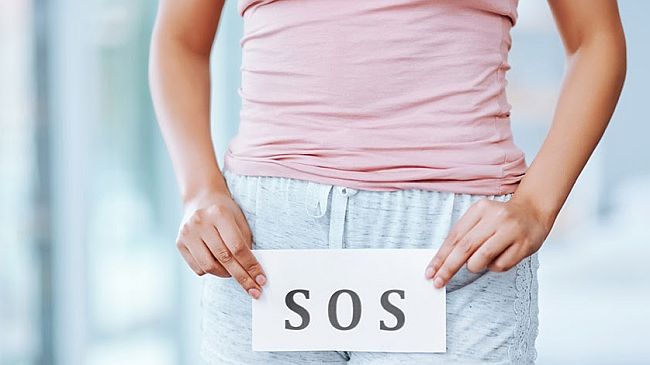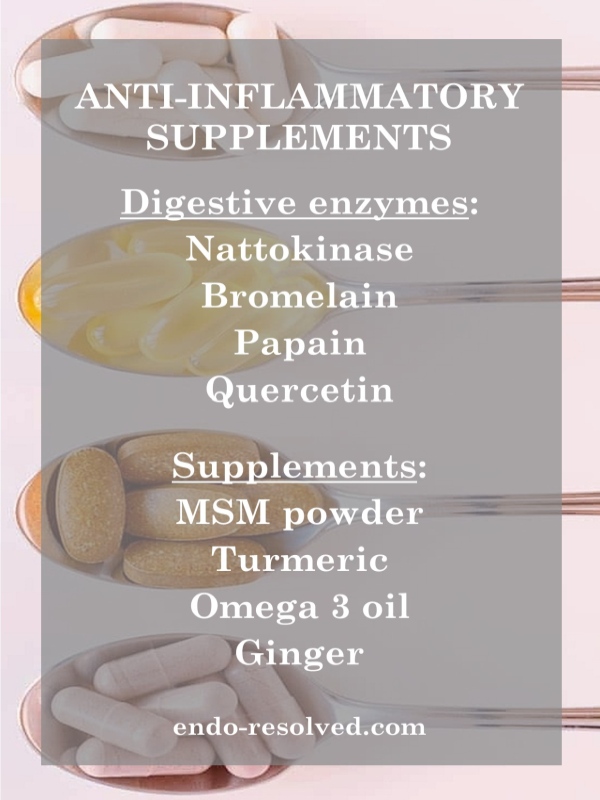Anti-inflammatory supplements to help endometriosis

Adding certain anti-inflammatory supplements to your diet may help with the various inflammatory reactions and symptoms that occur with endometriosis. Inflammation can occur due to damaged tissue caused by cysts and adhesions. as well as the inflammation and scarring that occurs from surgery. This inflammatory reaction is a natural process of the body trying to protect itself from further damage.
Anti-inflammatory supplements will also help with any inflammatory reaction that has occurred in the digestive system. This can be caused by IBS, Candida, bowel prep medication, and also if endometriosis has involved the bowel or digestive system. Most of these anti-inflammatory supplements can help with digestive issues as well, especially ginger and digestive enzymes.
Digestive Enzymes
Several digestive enzymes are really useful in relieving the pain associated with endometriosis. They can also help to reduce scarring and inflammation of the implants that occur with this disease as well as their obvious benefits in aiding the digestive process and helping with the breakdown of food.
These enzymes include: bromelain, a digestive enzyme extracted from the stem of the pineapple (500 to 1000 mg. four times a day taken apart from meals); papain, an enzyme derived from papaya (200 to 300 mg. four times a day apart from meals). Other useful anti-inflammatories include quercetin, a potent antioxidant (300 to 600 mg. per day). A number of supplements actually combine bromelain, papain and quercetin together.
Feedback from endometriosis sufferers saying they have found these digestive enzymes to be really helpful with reducing their symptoms. There are several digestive enzyme products on the market and deciding which one to use can sometimes come down to cost, or availability of the product in your country.
Nattokinase
This substance is an enzyme derived from natto, a food made from fermented soybeans (fermented soy based products are safe to use with endometriosis) and primarily eaten in Japan. Natto is a traditional Japanese food with a long history of use.
The benefits of nattokinase for endometriosis are thought to be due to its ability to dissolve fibrin that forms the mesh structure in blood clots. It is also thought to break down the adhesions, or scar tissue, that are commonly associated with endometriosis and form from the inflammation and recurrent bleeding that is seen with the disease.
From experience I have found nattokinase to be rather expensive and another supplement with very similar properties is serrapeptase which is readily available. Many women have reported great success using Serrapeptase for endometriosis and it is reported to be able to reduce cysts and well as reduce adhesions.
Nattokinase should be used with caution by women who are on anti clotting drugs like Coumadin since it can increase the risk of bleeding or haemorrhage. The same cautions apply to drugs that cause thinning of the blood like aspirin and ibuprofen.
Turmeric (curcumin)
Turmeric has been used for thousands of years in Indian cooking and in India’s traditional Ayurvedic medicine. The turmeric plant, grown from India to Indonesia, is related to ginger and has pulpy, orange, tuberous roots that grow to about two feet in length. It is an indispensable part of the mixture of spices known as curry powder.
The medicinally active compound in turmeric is curcumin, the rich orange-yellow pigment that gives turmeric its characteristic orange-yellow colour. For thousands of years, curcumin has been used in both Chinese and Indian systems of medicine as an anti-inflammatory agent and for the treatment of numerous health conditions.
Modern research corroborates its use as an anti-inflammatory. Studies have noted that an added benefit of turmeric is that it does not normally cause side effects, providing a safe alternative to these powerful anti-inflammatory drugs, which can cause gastric irritation and even peptic ulcers in susceptible people.
Turmeric also has benefits in reducing the inflammation of endometriosis, both through use in the clinical treatment of endometriosis as well as in animal studies. One study reported in the Indian Journal of Biochemistry and Biophysics found that curcumin had strong anti-endometriosis benefits in an animal model.
Suggested Dosage:
The recommended dosage for turmeric as an anti-inflammatory agent is 400 to 600 mg three times a day but if you taking a stronger supplement then you will only need to take it once a day. It is often formulated with an equal amount of bromelain as well as black pepper that aid in absorption. It is best taken on an empty stomach, twenty minutes before meals or between meals. Toxicity reactions have not been reported at standard dosage levels.
Omega 3 oils
Omega 3 oils help to produce the anti-inflammatory prostaglandins, which in turn will help to reduce the symptoms of pain and inflammation with endometriosis.
The Low Down on Omega-3 to help with endometriosis
Omega-3 is an essential polyunsaturated fatty acid; it is called essential because the body cannot produce it so we must eat enough of it in our diet. There are different forms of omega-3, with docosahexaenoic acid (DHA) and eicosapentaenoic acid (EPA) being the active forms that are readily available for the body to use – the best source of DHA and EPA is oily fish.
Another form called alpha-linolenic acid (ALA) can be obtained from some plant foods, including chia seeds and walnuts. However, ALA isn’t readily available to use and the body doesn’t convert it to DHA and EPA very well, so the preferred food source is oily fish.
DHA is the most common fatty acid found in brain tissue and plays a key role in brain development and function; studies have shown time and time again that people with a lower intake of DHA fatty acids have an increased risk of low mood and depression, and those with a higher intake have a reduced risk, demonstrating its importance in mood regulation.
Low-grade chronic inflammation and oxidative stress has also been implicated in many diseases, especially endometriosis. As a natural anti-inflammatory, omega 3 is crucial in reducing inflammation and as such, supplementation has been shown to be really helpful in reducing inflammation.
Omega 3 can also support our mood because it helps our brains to adapt; the technical term for this is brain plasticity, which simply means how well our brains can adapt and change based on our experiences. Depression has been shown to interrupt this process, but there is evidence that omega 3 can promote brain plasticity and this is thought to be protective against depression. Finally, our gut has a big influence on our mood, through regulation of the gut/brain axis; omega 3 is a vital nutrient for the health of our gut and therefore the health of our brain.
As oily fish is such a rich source of high-quality omega 3, you should try to consume 1-2 portions a week if possible. However, this can be challenging for many people who simply do not like the taste. As well as choosing other sources of omega 3, such as chia seeds, hemp seeds and walnuts and , you may also wish to add in a high-quality omega 3 supplement to ensure that your body is getting all it needs.
Snippets . . . .
Omega 3 can help with mood, anxiety and depression due to its effect on calming inflammation in the brain as well as in the body. An additional benefit of supplementing omega 3 to fight brain inflammation, includes improved memory and cognitive function.
Omega 3 also helps reduce cortisol levels, which is obviously a benefit for those of you with high cortisol levels. Taking omega 3 in the evenings can help to reduce your cortisol levels and in turn can aid in sleep, as high cortisol can stop you from sleeping.
Note: Please be very cautious with omega 3 if you do have low cortisol as it WILL reduce your cortisol even further. I have first hand experience of this and it will make you feel rather poorly by reducing your cortisol even lower.
Extract from: Endometriosis Healing from the Inside Out
Ginger
Ginger has excellent soothing and inflammatory benefits on the digestive system as well helping reduce inflammation generally. You can buy ginger in a supplement form or buy fresh root ginger and shred it to make your own fresh ginger tea – very helpful and soothing for nausea and digestive upset.
You can combine the healing and anti-inflammatory benefits of turmeric and ginger by making them into smoothies with the addition of your favourite ingredients.
- Carrot, ginger and turmeric smoothie
- Mango turmeric, ginger with Greek yoghurt
- Orange, turmeric and ginger smoothie
- Turmeric ginger and banana smoothie
- As well as the classic healing Golden Milk drink

About the Author
Hi, I am Carolyn Levett, the Founder here at endo-resolved - I am an Integrative Health Coach having studied nutrition, naturopathy and aromatherapy as well as being a published author of three endometriosis books. I used to suffer from severe endometriosis and was fortunate to be able to regained my health and recover from this disease with the support of nutrition, natural therapies and lots of determination.
My motivation is to help other women with endometriosis to heal their bodies so they may start to overcome this awful disease without having to totally rely on toxic drugs and surgeries which can cause further damage - with healing thoughts, Carolyn.
Reference:
https://www.ncbi.nlm.nih.gov/pubmed/6366808
https://www.ncbi.nlm.nih.gov/pubmed/2647603
https://www.ncbi.nlm.nih.gov/pmc/articles/PMC5790697/
 As featured in:
As featured in:





